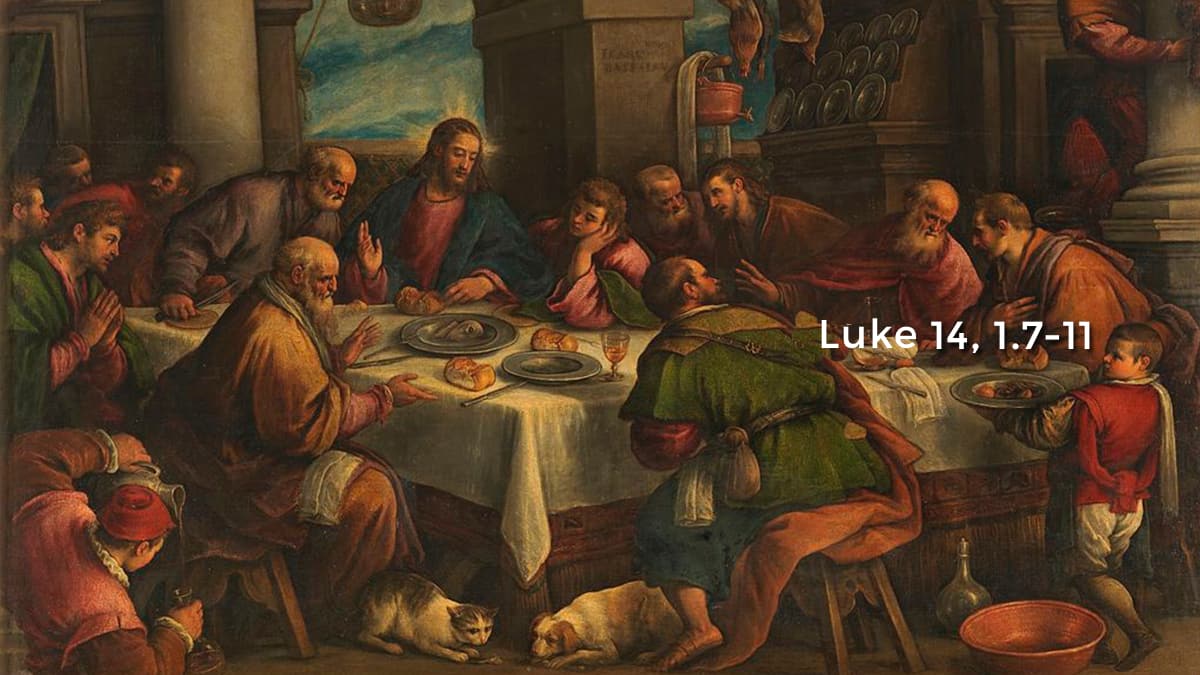
October 29, 2022 – Luke 14:1, 7-11
Today’s Gospel presents us with Jesus dining at the home of one of the chief six Pharisees.
In the context of the banquet Jesus takes occasion from the fact that the guests were choosing the first places to tell them a parable (v. 7). First, Jesus suggests, when one is invited to a wedding, not to put oneself in first place, lest one be relegated to last if a more notable guest arrives (vv. 8-9). In a positive sense, however, Jesus advises putting yourself in last place, with the prospect that the host will invite you to take a better place (v. 10). To this parable the evangelist Luke adds a wisdom maxim: “He who exalts himself will be humbled, and he who humbles himself will be exalted” (v. 11; cf. Lk. 18:14). The term “exalt” recalls the fourth psalm of the Servant of YHWH, which begins precisely
with these words, “My servant ‘shall be exalted’ (hypsôthêsetai).” In the continuation of the hymn it appears that his exaltation is the consequence of his lowering himself to the service of the people. Putting himself in the last place thus means abandoning the pursuit of personal power and glory and putting himself at the service of his brothers and sisters.
In the second part of the passage Jesus turns to the master of the house and gives him a teaching that transcends human patterns. He suggests to him, when offering a lunch or dinner, not to invite his friends, nor his brothers, nor his relatives, nor rich neighbors because all of them can reciprocate the favor received (v. 12). Instead, he must invite the poor, the crippled, the lame, the blind, thus ruling out at the outset the possibility that the invitation will be reciprocated (vv. 13- 14). This suggestion, applied to the Christian life, means that the good done will receive a reward not from men but from God. To avoid any misunderstanding Jesus adds that those who behave in this way will receive their reward at the resurrection of the righteous, that is, they will enter the kingdom of God that Jesus proclaims.
Jesus points, therefore, to total gratuity, the only one that can open entry into the kingdom of God, which is not earned by one’s own efforts, but is obtained from God as a free gift, not-only at the end of time but already now in daily life. The image of the banquet means that helping the needy must travel the difficult road of sharing, which consists not in giving something to the other, but in establishing those new relationships that anticipate already in today the future reality of the kingdom.
Let us remember that:
– ‘He who exalts himself will be humbled, and he who humbles himself will be exalted’ is another way of reiterating what Jesus taught earlier, and, namely, that the greatest in the Kingdom of God is the one who makes himself available to others, who uses his gifts in doing good to others and who has no interest in titles, dignity or social status.
Almighty and eternal God,
increase in us faith, hope and charity, and that we may obtain what you promise, make us love what you command.
Fr Joby Kavungal RCJ
TREZZANO SUL NAVIGLIO – MILAN

